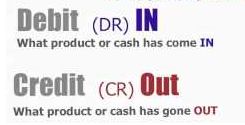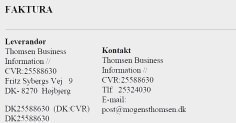Fritz Sybergs Vej 9
DK 8270 Hojbjerg
Scandinavia
info@dynamicbusinessplan.com


Vouchers
A voucher is required to register a transaction. Bookkeeping is registration of all financial transactions of a company.
You must have a voucher:
- Whenever you buy something
- Whenever you sell something
- Whenever you settle an invoice for something you have bought on credit
- Whenever a customer, whom you have granted a credit, settles his/her debt
Vouchers, receipts, invoices etc. are the foundation of the accounting system. Without vouchers, receipts, invoices etc. there could not be an accounting system.
This may appear overwhelming. Usually, it is just a matter of once and for all getting the routines straight, thus securing a correct registration.
Definition of a voucher
A voucher is a piece of paper featuring information on the transaction. Various requirements apply to a voucher depending on the nature of the transaction. Some transactions do not require a voucher.
Numbering vouchers
When documenting a posting by a voucher, you give the voucher a number. When using a PC bookkeeping programme the programme will issue the number, when you do the bookkeeping. You write this number on the voucher.
When auditing the accounts you can use this number to identify the voucher. Vouchers are filed in numerical order in a ring binder.

When no receipt is available
Sometimes it can be difficult to get a voucher from a supplier. It is therefore a good idea that staff, who are sent out to buy small items for the company, carry a receipts book.
- Example:
The company´s driver or the shop assistant goes to the market to buy a special item. The salesperson at the market may not be able to give a receipt.
In this case they can take out their own receipt, write the proper text and figure and get the sales person´s signature on it. They also sign it themselves and now the company has a voucher for the accountancy.
- Go to next business issue: Invoice - How to make it

Any time is a good time to start a company.
– Ron Conway, Noted Startup Investor




































